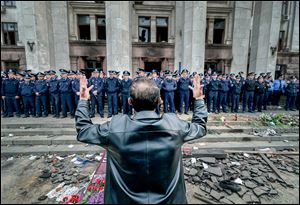
SLOVYANSK UNDER SIEGE
Kremlin: ‘Thousands’ beg for help
Pro-Russia militants free international observers
5/4/2014
Police guard the burned trade union building in Odessa, Ukraine, on Saturday. More than 30 people died trying to escape during clashes the day before.
SLOVYANSK, Ukraine — Ukrainian security forces pressed their assault to try to reclaim the pro-Russia stronghold of Slovyansk on Saturday, even as the militants freed seven European military observers and the Kremlin cited the deaths of dozens of people in Odessa as proof that Ukraine could no longer protect its citizens.
The Kremlin is receiving “thousands” of calls for assistance from Russian speakers in eastern Ukraine, a spokesman said on Saturday, but the Russian government has not yet decided on a response.
“People are calling in despair, asking for help. The overwhelming majority demand Russian help,” Kremlin spokesman Dmitri Peskov said. “All these calls are reported to [Russian President] Vladimir Putin.”
The Kremlin, however, has not yet decided how to respond, Mr. Peskov said.
He said Russian authorities have lost their ability to influence pro-Russia militants in eastern Ukraine and that they would not be able to resolve the situation alone.
Ukrainian troops built on recent advances into Slovyansk’s outskirts, entering the neighboring town of Kramatorsk.
The Interior Ministry said the forces had recaptured the main state security building and a television tower, allowing the resumption of Ukrainian television broadcasts that had been switched to Russian stations several weeks ago.
But even with the advance, the violence Friday in Odessa, west of Ukraine’s restive eastern region, was a measure of how far events have spiraled out of the authorities’ control.
An official in Odessa said 46 people had died in street battles between pro-Russia and pro-Ukraine groups, but many of the dead were pro-Russia militants who had retreated into a trade union building that was then set on fire. If confirmed, the death toll would be the highest since the struggles in February that ousted Ukraine’s pro-Russia government of President Viktor Yanukovych.
Amid the chaos, which included the lobbing of Molotov cocktails, it was not clear who started the blaze.
A report from a pro-Ukraine national newspaper, Ukrainska Pravda, suggested that Ukrainian activists had done nothing to help those inside.
“As the building burned, the Ukrainian activists continued to scream mottoes about Putin and sing the Ukrainian national anthem,” the article said.
Ukraine’s Foreign Ministry blamed provocateurs “paid generously by the Russian special services,” while Russia’s Foreign Ministry blamed a Ukrainian nationalist group, Right Sector.
Authorities in Odessa said 214 people were injured in the violence Friday, including 88 who were hospitalized.
Three days of mourning were declared.
Moscow used the violence in Odessa to denounce the idea of holding nationwide elections in Ukraine on May 25 to select a new president and vote on constitutional reforms.
Mr. Peskov said any discussion of proceeding with the vote would be “absurd.”
The United States and Germany have threatened new sanctions against Russia if it disrupts the elections.
Mr. Peskov said Russia would no longer be able to tell the hundreds of ethnic Russians who he said were calling for help not to take up arms when there was “a direct threat to their lives.”
“The authorities in Kiev are not only directly responsible, they are direct accomplices in these criminal actions,” Mr. Peskov said. “Their hands are full of blood.”
He also said the United States and the European Union bore some responsibility for the continuing violence because they had endorsed Ukraine’s military operations against pro-Russia militants.
In a diplomatic success, pro-Russia militants freed the European military observers who had been held — four Germans, a Czech, a Dane, and a Pole.
The German-led team had been detained April 25 while working, at the Ukrainian military’s invitation, to assess security conditions in eastern Ukraine.
The mission was part of a process approved by the 57-nation Organization for Security and Cooperation in Europe, to which Russia, Ukraine and the United States belong.
A spokesman for the self-declared authorities in Slovyansk would not comment on whether the militants still saw the observers as NATO spies, on what led to the release, or on whether any prisoners held by Ukraine’s government had been freed in exchange.